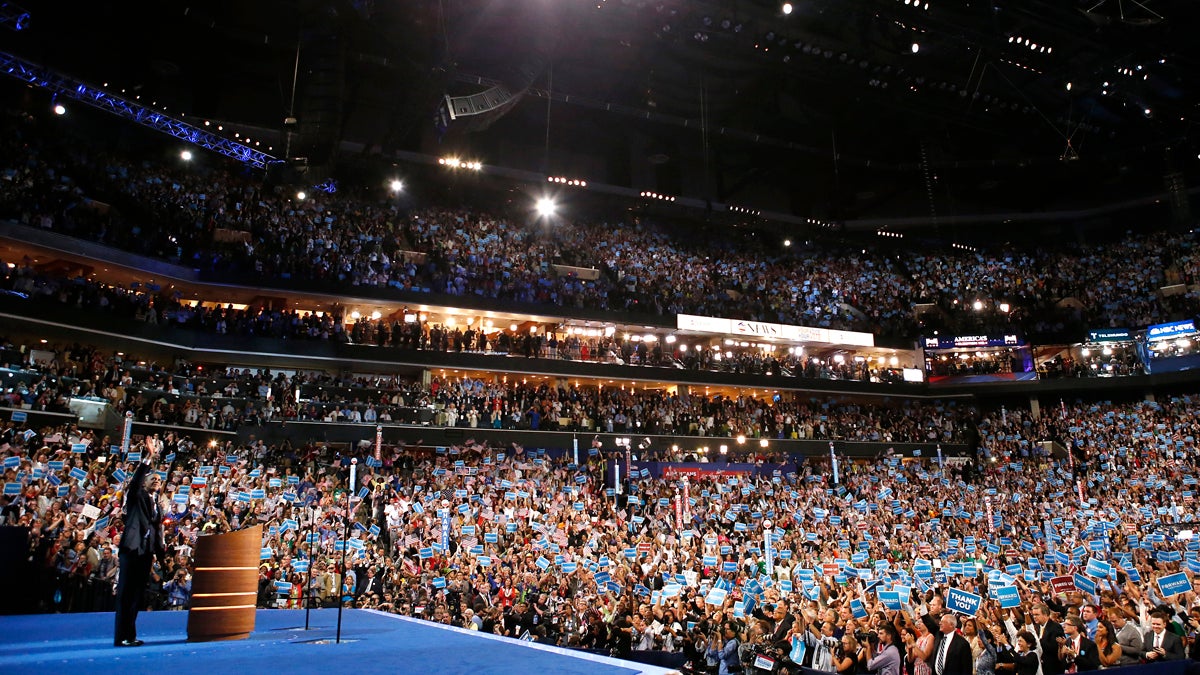Trying to lure a 2016 convention to Philly—is it worth it?

President Barack Obama waves after his speech at the Democratic National Convention in Charlotte, N.C., on Thursday, Sept. 6, 2012. (AP Photo/Jae C. Hong, file)
Can Philadelphia land the 2016 Democratic presidential convention?
Maybe. But here’s another question: Are we sure we want to?
When the political parties pick your city to host a national convention, they expect you to really host it, to the tune of tens of millions of dollars’ worth of services and cash.
This is all laid out in requirements that competing cities get before they ever apply and enforced in contracts once the host is selected.
Take a look at the contract between the Democratic National Committee and Charlotte, N.C., for the 2012 convention.
The city’s host committee had to commit to raise $36.6 million in private contributions to fulfill its obligations under the deal, which included providing:
1. Use of the city’s arena for a full week at no charge to the DNC.
2. Media workspace adjacent to the arena with 200,000 square feet of rentable space.
3. 50,000 square feet of furnished, class-A office space in downtown Charlotte for the DNC for five months.
4. 250 air-conditioned buses to transport delegates and others.
5. Use of 50 vehicles for a year before the convention and 350 during the convention.
6. 800 laptop computers, 150 black and white laser printers, 100 color printers, 100 network-enabled photocopiers, 700 smartphones, and on and on.
Democratic National Committee representatives wouldn’t talk with me about their plans for 2016, but, trust me, this stuff is pretty much the way it goes. We know because we’ve been there.
When Philly got a big one
I was covering City Hall in the late ’90s when the city set a goal of getting one of the major conventions in 2000.
It was an impressive effort, led by energetic and talented people. By 1997, there were more than a dozen committees at work on everything from fundraising to transportation.
They applied to both parties, and when the Republican site selection committee came to town, they were blown away. Philadelphia got its first convention since 1948.
It wasn’t cheap or easy. The city put up about $60 million overall, about $39 million from public sources. There were massive demonstrations and plenty of lawsuits that came of the police response. But in the main, it worked.
At the time, it made sense to me for the city to take a shot at this.
Just a few years before, the city had been broke and dispirited, associated in the national media with phrases including “financial basket case.” By the late ’90s the city had not only restored financial stability, but had experienced a commercial and cultural rebirth, particularly in Center City.
There was a new convention center, hotels and a host of venues on Broad Street to show off. I’ve always thought Philadelphia was an unknown treasure and found friends from across the country loved the place when they got here and spent some time.
So when all those Republicans and 15,000 media representatives arrived in August, 2000, I was all for it. It was a great confidence-booster for the city to pull it off, and thousands of people from the region volunteered to work for the host committee.
I don’t know how much the city looking pretty on TV matters really. I do think that thousands of well-heeled and connected people coming and having a great experience here can benefit the city in a hundred ways that are hard to measure. It can get people to come and visit again, or tell their friends and relatives about the city, or make it more likely they’d send a kid to college here, or consider it as a place to do business.
But Philadelphia in 2013 isn’t the same place as Philadelphia in 1997. We aren’t coming out of a brush with fiscal death and are more established as a place to visit, at least in my mind. I’m not sure it’s worth the effort and expense it would take to attract a political convention.
And I know they aren’t the same thing, but imagine us struggling to find tens of millions for a big political party when our schools are on the edge of collapse.
Sure the hotels would love the business. But, gosh, haven’t we subsidized them enough with the convention center, the direct assistance some of them got to open and the ongoing promotion funded by the room tax?
Maybe I’m wrong
Talk to folks in the tourism and hospitality world, and they’ll tell you that if you want to keep your share of the market, you have to keep working at it.
Meryl Levitz, CEO of the Greater Philadelphia Tourism Marketing Corporation, told me that, yes, Philadelphia isn’t what it was in 1997. It’s better, and that’s a reason to let people know.
Levitz was one of those assembled by U.S. Rep. Bob Brady last week to talk about putting together a bid for the 2016 Democratic National Convention. She said whether the city mounts a serious bid for the convention or not, there’s value in the conversation.
“It forces people to come together in the same room, look at their city—out of the space of the grueling day-to-day, how are we going to handle this, how are we going to handle that—and look at bigger issues,” Levitz said. “Issues of access and transportation, and technology and visitor friendliness, and the future of the city, whether we get the event or not.”
Mayor Michael Nutter said he’s very interested in the idea of competing for the convention but that cost is a serious issue.
Indeed. When the 2012 convention was over, the Charlotte host committee was $10 million in debt.
WHYY is your source for fact-based, in-depth journalism and information. As a nonprofit organization, we rely on financial support from readers like you. Please give today.

